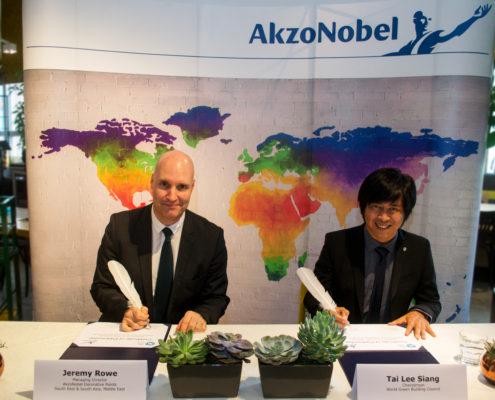AkzoNobel Partners WGBC to Strengthen Sustainability Agendas

AkzoNobel and WGBC partnership will provide greater ground-up push for Green Buildings in Asia Pacific.
AkzoNobel, a leading global paints and coatings company and a major producer of specialty chemicals, signed an agreement on 7 July 2017 to work closely with the World Green Building Council (WorldGBC), as a Regional Partner of its Asia Pacific Network.
The partnership will further the goal of providing more ground-up push for Green Buildings in Asia Pacific. The two organisations will be exploring more opportunities to promote awareness of the significance of Green Buildings and sustainability, by organising and supporting more private and public sector symposiums.
The partnership between AkzoNobel and the WorldGBC comes in response to WorldGBC’s recent report which calls for a dramatic and ambitious transformation towards a 100% net zero carbon built environment. To keep global warming well under two degrees Celsius as committed in the Paris Agreement, all buildings must operate at ‘net zero carbon’ by 2050.
AkzoNobel’s own Planet Possible sustainability agenda aims to be carbon neutral and use 100% renewable energy by 2050.
Top-down government regulations and incentives continue to be some of the key primary drivers for sustainable developments in many cities in Asia Pacific and there is more need for early adopters and green building experts in private sectors.
Mr Tai Lee Siang, Chairperson of the WorldGBC, elaborated: “We need to empower our community to drive change, and in order to achieve better results, there needs to be more industry involvement and adoption of sustainable practices in every aspect of design, development, operations and more importantly, behavioural change, across entire regions.”
Mr Jeremy Rowe, Managing Director at AkzoNobel Decorative Paints, South East & South Asia, Middle East, added: “We’re committed to developing a more sustainable business and creating more value from fewer resources. We are taking on a ground-up approach by encouraging a continuous regional dialogue through the ‘Human Cities’ series of symposiums in several cities including Vietnam, Singapore and Indonesia. These are held in Asia where government and private sector will jointly sit together.”
Green Buildings support better lives
Going beyond the building sector, the partnership ultimately aims to increase knowledge and relevance of green building practices and concepts to the members of the public. However, the key challenge is to relate the benefits of green buildings to the man-on-the-street.
Mr Tai commented that, “there can be more information on how green buildings can support better and more productive lives.” As an example, the Harvard School of Public Health study has shown that people in green, well-ventilated offices recorded a 101% increase in cognitive scores.
Mr Rowe said, “There is ample opportunity to boost green product innovation that benefits consumers. In the last five years, we invested €1.83 billion in research and development. Over 50% of our innovations will provide distinct sustainability benefits for our customers and their value chains, according to targets AkzoNobel has set.”
In line with this, AkzoNobel’s Human Cities Initiative underscores their commitment to creating everyday essentials to make people’s lives more liveable and inspiring. Since it was launched in 2014, the Human Cities initiative has resulted in 300 projects that have benefited 9 million people worldwide.


